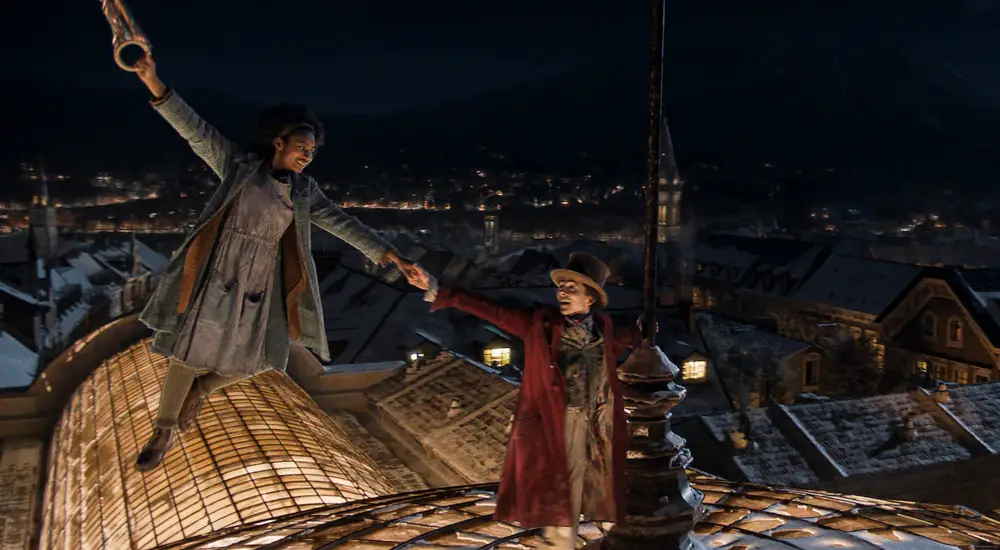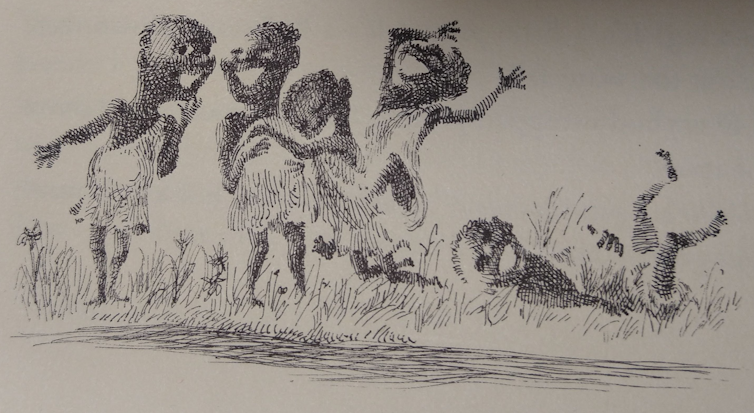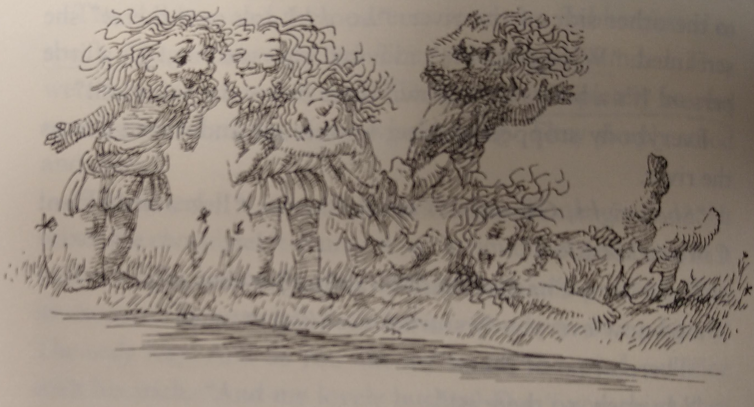
By Meisha Lohmann
Several years ago, I made a visit to a local book sale and came across a rare 1964 edition of Roald Dahl’s “Charlie and the Chocolate Factory.” Popular in its own right, the novel has also served as the inspiration for a number of movies, including “Willy Wonka & The Chocolate Factory” – the classic 1971 movie starring the late Gene Wilder – a 2005 reboot starring Johnny Depp, and “Wonka,” the 2023 version.
As a child of the 1980s, I had voraciously consumed Dahl’s novels, so I knew the book well. But the illustrations in this particular edition looked unfamiliar.
Once I brought the worn and tattered book home and began to read it aloud to my kids, I realized that some passages looked unfamiliar as well. My voice faltered as the Oompa-Loompas – the pint-sized workers in Wonka’s chocolate factory – appeared and Charlie asked, “Are they really made out of chocolate, Mr. Wonka?”
To which Wonka replied: “Nonsense!”
“They belong to a tribe of tiny miniature pygmies known as Oompa-Loompas,” Wonka explains in this version of the book. “I discovered them myself. I brought them over from Africa myself – the whole tribe of them, three thousand in all. I found them in the very deepest and darkest part of the African jungle where no white man had ever been before.”
The accompanying black-and-white illustration of several dark-skinned Oompa-Loompas left me stunned.


Dahl’s book is part of a long history of children’s books that feature racist stereotypes – a list that includes six Dr. Seuss books that were removed from publication in 2021. Other children’s classics, such as “Peter Pan” and “Mary Poppins,” have also been criticized for perpetuating racism.
As an English lecturer who specializes in decoding some of the hidden meanings and dark realities in popular children’s stories, I looked deeper into the blatant racism in the 1964 edition of “Charlie and the Chocolate Factory,” comparing it to a more recent copy from 2011.
Notably, the description of the Oompa-Loompa’s skin had been changed from “almost black” to “rosy-white.” And rather than coming from Africa, they came from “Loompaland.” I learned that these changes were made by Dahl for the 1974 edition after criticism by the NAACP and others. Dahl’s response was to remove the Black characters altogether.
Yet as philosophy lecturer Ron Novy points out, even the latest editions of the book still perpetuate racist and imperialist ideologies.
Parallels with slavery
When Wonka describes how he “smuggled” the Oompa-Loompas into the country in “large packing cases with holes in them,” the image clearly recalls slave ships navigating the Middle Passage. Wonka’s promise to pay the Oompa-Loompas’ wages in cacao beans, and the admission that no one ever sees them come in or out of the factory, reinforces the Oompa-Loompas’ subjugation to Willy Wonka, who plays the role of their “Great White Father,” as fourth grade reading teacher Katherine Baxter noted in 1974.
Historian Donald Yacovone has pointed out that, even in its revised form, “Charlie and the Chocolate Factory” has long contributed to the perpetuation of white supremacist ideology. Not only do the Oompa-Loompas immediately appear – ready to obey – whenever Wonka clicks his fingers, but Wonka is also repeatedly dismissive of them. He calls them “charming” but tells his visitors not to believe a word the Oompa-Loompas say. “It’s all nonsense, every bit of it!”
Wonka even uses the Oompa-Loompas as experimental subjects. He feeds them gum that turns them into blueberries and fizzy drinks that send one unfortunate man aloft until he “disappeared out of sight” and was never seen again. These experiments seem a grotesque parody of the myriad cases of enslaved and free Black Americans who have been subjected to experimental surgeries, treatments and medical neglect.
In both the book’s current version and in the original, he smuggles them into his factory and pays them in cacao beans because they were “practically starving to death” and cacao was “the one food that they longed for more than any other … but they couldn’t get it” on their own.
It’s an absurd assertion that this community of people, originally located in the heart of Africa, cannot access a crop that, while native to the Amazon, is primarily grown in West African countries. That they need Wonka to give them access to the resources of their own land is a damaging colonialist fantasy – one which, as Yacovone notes, has historically buoyed, rather than diminished, the popularity of the novel and the 1971 and 2005 films.
Maintaining the status quo
Unfortunately, the latest Wonka movie also engages in the type of implicit racism that remains in the revised 1974 version of the novel. The most prominent Black character, a girl named Noodle, played by the talented Calah Lane, takes a back seat to Wonka in the major events of the film.
The new Wonka almost broke from the tradition of having Wonka played by white men. Early in the new film’s conception, Newsweek reported that actor, comedian and musician Donald Glover was under consideration for the lead role, a choice that could have at least begun to force a rewrite of the original novel’s racist narrative.
Instead, the film casts Noodle in the position of an unfortunate Black girl who can only hope for a ride on Wonka’s velvet coattails.
“I know things haven’t been easy for you,” Wonka says in the movie. “They’re going to get better.”
“You promise?” Noodle replies, hopefully, and he does promise, highlighting his role as her white savior. Another character in voice-over agrees: “You could change her life, Mr. Wonka. Change all their lives.”
I was initially hopeful about the prospect of a movie that moves away from the novel’s racist origins, yet still imparts the power of imagination on a new generation. Unfortunately, moviegoers may find themselves having to hold their breath and make a wish, as Gene Wilder stated in a song from the 1971 movie, for a version that holds no remnants of its racist past.
![]()
Meisha Lohmann is Lecturer in English Literature at Binghamton University, State University of New York.





























Pogo says
@Meisha Lohmann
Were you bitten by a Vermicious Knid? FFS — just enjoy the goddamn movie. Try that.
Greg says
It’s a fairy tail story. Get a life!
Philip says
“The more things change, the more they stay the same”
Laurel says
Oh my gosh. My favorite Dr. Seuss book was “Horton Hears a Who.” Was that a jab at little people? It’s a story about “…an elephant protects a tiny planet “Whoville” from animals who mock him. The book explores the themes of individuality, friendship and social justice” according to Wikipedia.
Most of the issues here were written a long time ago. We need to recognize that, and stop weeding everything out. My favorite cartoons, when I was a kid, was the 1950’s-6o’s Warner Bros. cartoons, with Daffy Duck, Bugs Bunny, Witch Hazel and so on. I know of people who refuse to watch these fabulous cartoons because of a couple of early on *F* ups. They don’t seem to acknowledge that two of their goofiest characters where the white Elmer Fudd and Yosemite Sam.
Good ole cherry picking.
k says
let’s change everything huh? Literally no one cares about this. Your life has got to be utterly miserable if you see racism in everything. NO ONe cares. We just read the books and that’s that.
The Geode says
Why do white people concern themselves with racism more than black people? We don’t concern ourselves with “racism” until white people and the media (same thing) point it out and gaslight non-critical thinkers to react to it. As I stated before, white people think of us as pets or special needs that need to be wrapped in bubble wrap and wearing helmets.
We never thought Gene Wilder was a racist parading around with “orange little people”, we saw a funny man parading around with little people that to this day give me the “heebee-jeebies”.
Nobody ever said “racism” doesn’t exist. However, even when “racism” was fashionable and expected, we Blacks still managed to carve a life for ourselves, overcome it, and navigate around it. Fast forward to 2023 and it’s all about the past. All about slavery. All about turning a fractured race of people BACK into “slaves” using votes instead of labor and excuses, entitlements, and victimhood as compensation.
Most people don’t go on scavenger hunts looking to find racism under every rock. Some (like this person) do it to have a sense of superiority and feel like they’ve made their mark on the world by coddling and acquiescing without the sincere need to bother with empathy and opportunity. Some (the real racist) think that the virtue of their skin makes them superior despite being in the same or lower economic class as the people they think they are better than. These are the people you should save your pity for and stop wasting it on us…
Philip says
I don’t know that your statement is true: “white people concern themselves with racism more than black people.”
You don’t know all black people nor do I know all white people.
You are generalizing both groups, which is never valid.
Laurel says
Geode: Okay! I’m all for your independent nature, stay at it. Now you are starting to show the sparkling inside of the hard geode outer crust. Just stay away from the “pastey white liberal” crap. It tends to nullify whatever points you are making at the time.
We have close, “black” members in our family, and sometimes the things you write are offensive to us all. I think you tend to over react to what you may think all of us think. On that, you are wrong. Your anger is doing more damage to yourself, personally.
I’m glad you stay here.
Pencils II says
Yeah, we know, everything is racist and offensive. Woke cancel culture can go ahead and rewrite it now to fit their demographic when they’re done sobbing under their pillows.
If something offends you, ignore its existence. Something doesn’t feel inclusive to your demographic? Why fight trying to change it? Move on and do your own thing!
Philip says
You don’t have a very good grasp of history.
“Why fight trying to change it?”
Wow… quite a statement in the form of a question.